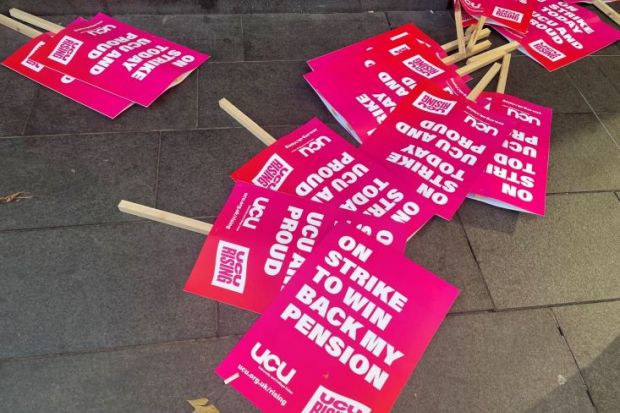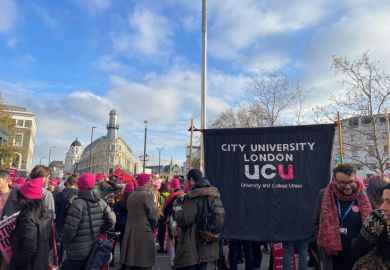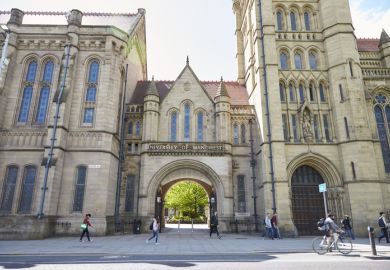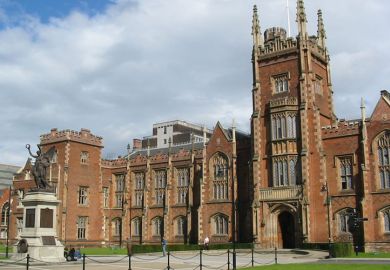There is “little evidence” that UK universities can avoid more marking boycotts in future, with new laws aimed at ensuring a “minimum service” during industrial action unlikely to work in higher education, a parliamentary committee has heard.
Appearing in front of MPs who are investigating the disruption in students’ education last year, University and College Union (UCU) leader Jo Grady said “technical fixes and rules and procedures” would not help as she claimed employers’ “intransigence” was to blame for the failure to find a resolution to the dispute.
Dr Grady repeatedly clashed with Raj Jethwa, the chief executive of the Universities and Colleges Employers Association (Ucea), who also spoke at the hearing and defended the organisation’s insistence that universities stick to a common position on staff pay.
“I’m afraid I haven’t seen much evidence that we couldn’t end up in a situation like this again if I’m honest with you,” said Dr Grady.
“The biggest safeguarding we can have…is to make sure the employment conditions in universities are as first rate as our reputation globally.”
The House of Commons’ Education Committee has begun an inquiry into the impact of the marking and assessment boycott, which ran from April until September 2023.
UCU members refused to mark work and take part in other assessment processes such as exam invigilation as part of a long-running dispute on pay and working conditions.
The committee estimates that the boycott left 11,300 final-year students unable to graduate on time and affected a further 20,000 students “less significantly”. Some were unable to proceed into jobs or further study, with international students – whose visas are tied to graduation – among those most severely affected.
Mr Jethwa said the boycott had affected only a small number of institutions but the fears about disruption were far greater because of the media coverage it received.
He said the price paid by students was “unacceptable” and claimed the union could have pursued other, less disruptive tactics such as boycotting research activities or academic conferences.
Dr Grady said the union had offered an interim agreement to end the boycott that hinged on a commitment to restore pay lost by staff taking part, but said the employer body “did not budge a single inch”.
Queen’s University Belfast was ejected from Ucea at the height of the dispute for offering its staff a higher pay rise than that agreed nationally, and Dr Grady said universities had been concerned about similar sanctions that prevented more progress being made.
Mr Jethwa defended this stance and said universities had been told not to depart from collective employer positions to ensure confidence in the process.
MPs are also investigating the measures taken by institutions to mitigate any marking delays. David Smy, the deputy director of enabling regulation at the Office for Students (OfS), said the regulator was still “engaging” with “a few” universities to “understand what they did during the process and whether we have concerns about that”.
Mr Smy said there was a need for universities and colleges to be clear and consistent in their policies regarding refunds and compensation after some affected students were given cash payments for the disruption they experienced and others were not.
Asked about legislation recently enacted by the government that would force trade union members in education and other sectors to continue to provide a minimum level of service (MSL) during a strike, Dr Grady said she did not believe many university employers would “touch them” and they were “ultimately destined to be futile if we don’t address the issues that make people leave the sector”.
“Do we want to address the issues that have meant we have had industrial action as an annual event in higher education or do we want to try to find technical fixes and rules and procedures that don’t fix the issue?” she asked.
In a rare case of agreement between the two parties, Mr Jethwa agreed “it was hard to know exactly how, in practice, MSLs might work in higher education”. He said institutions might feel pressure to use the new power, which, he believed, might end up being counterproductive by damaging industrial relations further.
Register to continue
Why register?
- Registration is free and only takes a moment
- Once registered, you can read 3 articles a month
- Sign up for our newsletter
Subscribe
Or subscribe for unlimited access to:
- Unlimited access to news, views, insights & reviews
- Digital editions
- Digital access to THE’s university and college rankings analysis
Already registered or a current subscriber?








